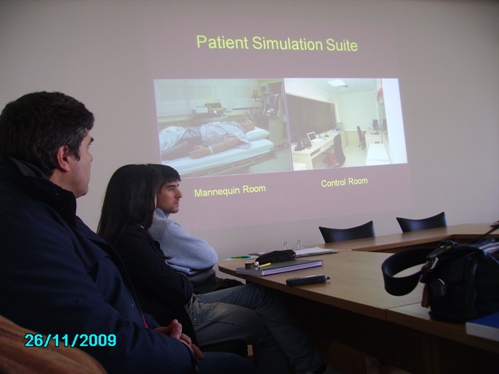MEDICAL SIMULATION: new learning method presented at Health Sciences Faculty
Integration of theory with practice, patient safety, practical skills development are the main advantages that can be reached through simulation-based learning, a method presented by Peter Mack at UBI.
> Benchea Iulia-Simona (Universitatea Alexandru Ioan Cuza)On 2nd of December, a session about Medical Simulation and Education took place at Beira Interior University, Health Sciences Faculty. “Understanding Simulation-Based Learning” was the subject that Peter Mack, director of SGH Institute for Medical Simulation and Education (IMSE) discussed about, revealing the importance of using medical simulation in complex learning environments. “This creates powerful learning opportunities. This also means that good simulation-based training requires a great deal of careful planning and construction.”
He started with an introduction on the adult learning principles, and their relevance to medical education. After that he focused on discussing about the development of simulation in medical training. He brought into discussion the challenges of teaching and learning in a chaotic environment when managing patient crisis, and how simulation can overcome that. “Simulation can involve making mistakes, and allow the carrying out of therapeutic procedures on a patient without a real disaster.”
Immediately after, he talked about how simulation training takes place in Singapore, pointing out the merits of this new learning method: integration of theory with practice, no risk to patients, practical skills development, the possibility of simulation time to be slowed down for detailed study of specific situations.
Students of Health Sciences Faculty took part at the session, as well as Miguel Castelo Branco, president of Health Sciences Faculty and Henrique Martins, professor in the Department of Medical Sciences. At Health Sciences Faculty, facilitators, the name of the people who work in simulation, are MD's, with professor Miguel Castelo Branco as the leader of “Clinical competences, aptitudes and attitudes” laboratory.
Medical simulation at Health Sciences Faculty “is doing small but careful steps, you're trying to see, analyze and adapt what others, around the world, are doing, to put it on practice with our students”, says Edmundo Dias, member of the Medical Simulation team at Health Sciences Faculty. “The presence of Peter Mack is another contact we have with someone with expertise in the area. It is always helpful, interesting and more ideas, goals and ways to achieve them appear on our minds”, explains Edmundo.

Multimédia